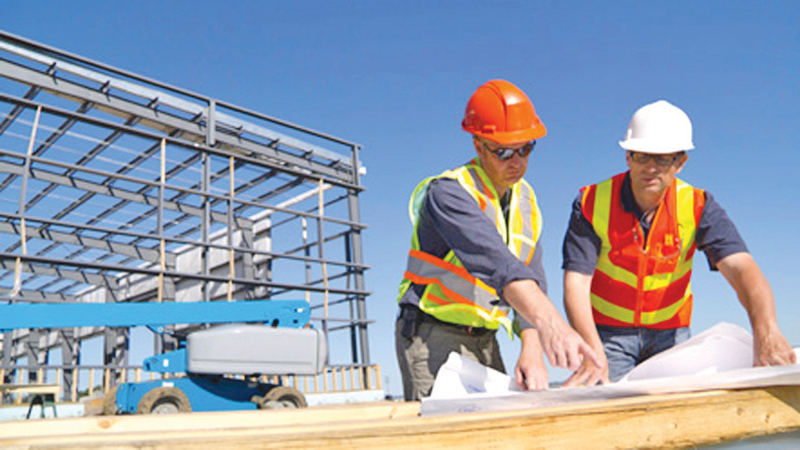- Dearth of construction craftsmen,
- quantity surveyors hinder growth
- Stopgaps for brain drain not enough
Sri Lanka’s construction industry, a pivotal cog in the economy, will need at least five years to recover from the 30% decline it recorded in 2022 with the onset of the global pandemic which had a devastating blow to the industry, said a senior official of the construction industry.
“The Easter Sunday attacks that dampen investor appetite followed by the Covid-19 lockdown and the domestic economic crisis brought the construction industry to standstill and since then the revival of the industry has been rather sluggish as capital infusion for projects have been hard to come by,” said Tudawe Brothers (Pvt) Limited, Chief Executive Officer Romali Tudawe.
The industry is nowhere near the pre Easter Sunday attack times in terms of its performance as the industry is on a survival mode, Tudawe said.
The construction industry she said which is a private and public sector-led industry are cash strapped to dump money on large scale construction projects.
What would happen eventually would be un-competitiveness and compromising of standards due to low pricing for survival, Tudawe said, adding that such practices would put the industry at a financial risk.
On the need for a Public Procurement Law she said what the industry has are procurement guidelines and not a law. The Procurement Appeal Board ensures the transparency of the government procurement process.
The Procurement Appeal Board looks into the appeals made by unsuccessful bidders who are dissatisfied with the recommendations of the Cabinet-appointed procurement committees and negotiating committees and to submit their recommendations to the Cabinet for consideration.
Tudawe alluded to the notion that there has to be a public procurement law to ensure transparency and fair play in the bidding process which is crucial for building investor confidence.
She also stressed the need to ensure the brain drain in the construction sector which aggravated with the economic crisis to be addressed urgently if not the industry would have to import labour.
“If the stable is not shut at least now the only option would be to import cheap labour from neighbouring countries as Colonial masters had to do it to meet the labour shortage in the plantation sector during the British era,” she said, adding that the huge deficit in quantity surveyors also weighed in heavily on the sustenance of the industry.
Meanwhile, the Chamber of Construction Industry of Sri Lanka (CCISL), the body that voices the concerns of the industry had called upon the Government to implement certain priority policy measures aimed at revitalising the construction industry.
The key proposals of the chamber comprises mandatory feasibility studies for large-scale projects, setting up a development bank, enacting a long-overdue public procurement law, and boosting construction service exports to place the industry on a sustainable growth path.
In its outlook for 2025, the Chamber stressed the need for reforms despite some signs of recovery in the sector.
The construction industry recorded satisfactory positive growth of 14.2 percent, 15.5 percent, and 23.8 percent, during the first three quarters of 2024.
Industry personal noted that the performance of the industry last year was a clear indication that it has overcome the recession during 2020–2023.
Among the major recommendations of the chamber was the need to undertake proper feasibility studies for projects exceeding Rs. 200 million. In the past, several large-scale projects launched without comprehensive feasibility studies to fast-track construction work, however, faced significant challenges later on, including legal disputes.
The Chamber also highlighted the importance of enacting the Public Procurement Law, which has faced delays despite repeated recommendations, including from the IMF. The proposed law aims to close loopholes in the procurement system, reduce corruption, and ensure competitive bidding.
“Procurement should be only on competitive bids based on BOQs, completed designs, and documentation to ensure timely completion and minimise cost overruns. There should be no unsolicited proposals considered,” it noted.
To further enhance transparency, the Chamber proposed that procurement committees for projects over Rs. 200 million include a senior professional nominated by CCISL as an industry representative.
Highlighting the need for better financial support, CCISL called for setting up of a development bank to promote innovation and project funding, a policy that the Central Bank has been attempting to move away from.
It also proposed reintroducing a housing loan scheme at a concessionary interest rate of 5 percent repayable over 40 years for first-time homebuilders, similar to European models.
The Chamber has also called for amendments to the Construction Industry Development Act, No. 33 of 2014, and the establishment of a Standing Steering Committee on Construction to oversee policy implementation and industry growth.






